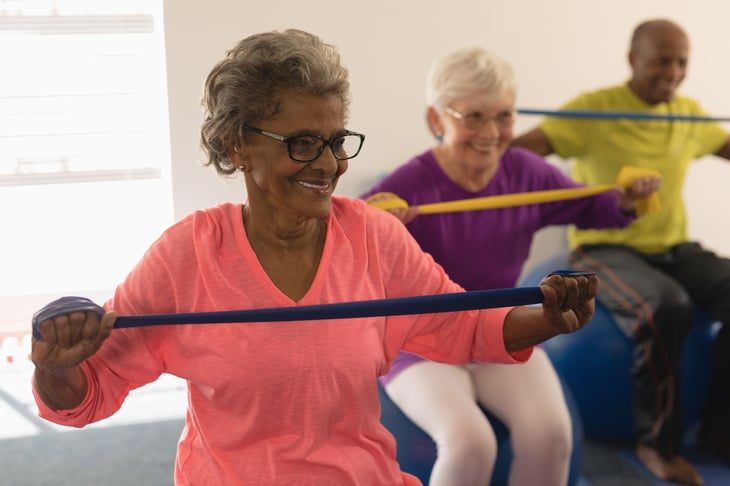
This story originally appeared on NewRetirement.
When you hear the phrase “preparing for retirement,” you probably think about savings and budgeting. However, your finances are just one aspect that you need to consider.
Sure, you need to have your financial situation in check when you retire, but other aspects of your life could use some prepping as well.
Here are some important retirement training tips to help you have a successful future.
1. Identify a role model for aging

Getting old is not something we necessarily look forward to. As such, it can be a good idea to look for role models for aging when you are preparing for retirement.
Who is someone older than you that you admire? How do they dress or act, and why is it appealing to you? What kinds of activities do they engage in? What is their attitude toward life? How do they interact with people?
You can look for role models in your parents and grandparents, celebrities, or a stranger you meet in the grocery store or coffee shop.
Research actually shows that having a role model for aging can help you. A study published by the Gerontological Society of America found that people who had a role model — particularly someone from their own family — had less negative views on aging.
Here are a few perspectives on aging from celebrities and other public figures:
- “Aging can be fun if you lay back and enjoy it.” (Clint Eastwood)
- “Aging has a wonderful beauty and we should have respect for that.” (Eartha Kitt)
- “I’m not an aging gracefully type. But I do believe in aging with grace.” (Danielle Steel)
- “The key to the future in an aging society is not found in increasing just our lifespan; we need to increase our health span at the same time.” (Chuck Norris)
2. Find a cause and commit to it

Linda P. Fried is a gerontologist and a professor at Columbia University’s Mailman School of Public Health. Fried wrote: “We are a species wired to feel needed, respected, and purposeful. The absence of those qualities is actually harmful to our health.”
When Fried was a practicing doctor, she would write prescriptions for her patients that said: “Find something meaningful to do.”
Retirement used to be a time of gradually fading away. However, now we retire in good physical, mental and emotional health with years and years of vitality ahead of us. Using our resources to help our communities — or for any kind of cause — is proven to help retain and enhance that vitality.
Researchers at Johns Hopkins University, Columbia University, UCLA and Washington University measured the impact of a volunteer-type experience on retirees. The retired volunteers put in 15 hours a week at a public school. At a follow-up of four to eight months, the volunteers showed a significant increase in physical activity, strength and cognitive activity.
Furthermore, walking speed decreased significantly less in the volunteers than in a control population. And, the volunteers reported improved strength, less pain and that they needed fewer diabetes medications during the school year to keep their blood sugar controlled.
They also felt like the program “dusted off the cobwebs in their brains.” And neuroimaging backs up the claim, showing increased brain activity and improved abilities in the areas of problem-solving.
If you are interested in finding a volunteer opportunity as part of preparing for retirement, here are some high-quality programs designed for seniors:
- Foster Grandparents
- Senior Companions
- RSVP (Retired and Senior Volunteer Program)
- OASIS Intergenerational Tutoring Program
- Experience Corps
3. Develop an intellectual hobby

Reading, learning a new language, taking a college course, playing an instrument, restoring cars, doing Sudoku puzzles: It doesn’t matter what you do. Developing an intellectual hobby and trying to improve your mastery of it can be incredibly helpful.
As they say: “Use it or lose it!”
We know from brain research that learning new skills and knowledge, and being able to flexibly shifting between them, is key to increasing brain health.
4. Try to maintain responsibility over your life

As we age, we sometimes slowly lose control over our own destinies. However, the more autonomy and personal responsibility we can maintain, the better.
In an astonishing study, researchers told one group of nursing home residents that they could arrange their own rooms, select their own activities and take care of a house plant. Another group was told that the staff would do everything for them.
After just three weeks, the independent group saw improvement in physical and mental well-being while the more controlled group declined or stayed the same. And 18 months later, the independent residents were twice as likely to be living.
The message is clear: Don’t give up. And think about the systems you can put in place to give you as much control over your choices as possible. Update your home for independent living and maintain your intellectual and physical health.
5. Take up a physical pastime

Whether you have an exercise routine or not, you probably understand how incredibly good physical activity is for you.
However, did you know that exercise does not necessarily need to involve sweat, toil and strain to be beneficial?
As you move into retirement, you will want to develop habits that keep you more active than sedentary. Think about developing hobbies that have a physical component: Do things that keep you moving.
According to Dan Buettner, author of “The Blue Zones, 9 Lessons for Living Longer From the People Who've Lived the Longest,” the longest-living people in the world make movement a natural part of their everyday life. They move in meaningful ways about every 20 minutes and walking is their primary mode of transportation.
Other research suggests that this type of active lifestyle is beneficial. Studies have also concluded that there are significant risks to sitting too much — many people are now calling sitting “the new smoking.”
As you move into retirement, think about setting up your routines to involve as much movement as possible.
- Develop hobbies that are active (gardening, woodworking, baking or running, biking, swimming)
- If you are relocating, think about the walkability of your community
- Stand while talking on the phone or whenever you can
- Walk to do your errands
6. Create social habits

Having friends and seeing them on a regular basis is an important way to stay healthy and engaged. However, staying social can be more difficult after retirement.
Meeting up with people takes a little more effort, since it is not automatically part of a routine, as it is when you are working.
As such, you will want to prepare for retirement by creating social habits. Arrange to meet with friends for coffee each morning. Join a club. Find a volunteer or part-time job opportunity.
Whatever you do, be sure to make it a habit and something where you will be held accountable.
Technology is making it easier and easier to stay at home. However, to retain your mental and emotional well-being, you need to be making regular physical contact with others.
7. Create and maintain a comprehensive retirement plan

Even though finances are not the only important part of retirement, they are an important aspect of preparing for retirement. Retirement planning does not need to be difficult. You just need to know what you have and how you are going to use it.
You can get a quick and easy analysis by using the NewRetirement Retirement Planning Calculator. This system is one of the most comprehensive and useful retirement calculators. It is really more like a virtual financial adviser.
You input your information and the system performs hundreds of different calculations and provides charts to help you understand your financial situation. Don’t like your results? The calculator lets you add more information, change your assumptions, and keep playing with your data until you find a financial plan that will work for you.





Add a Comment
Our Policy: We welcome relevant and respectful comments in order to foster healthy and informative discussions. All other comments may be removed. Comments with links are automatically held for moderation.